THE RAINS CEASE
We are given the record not only of the building up of the Flood but also of the prevailing and now the assuaging of the Flood.
We are told that “God remembered Noah”—how lovely—and that “God made a wind to pass over the earth, and the waters assuaged.” It did not happen just overnight. The buildup of the waters took over 150 days, and then there were 261 days in the assuaging.
That looks to me like it is something more than just a local flood.
Genesis 6 and 7 explain the events leading up to the flood, and the actual catastrophe itself. After the devastation and destruction are over, God begins to dry out the earth in Genesis 8.
The waters recede, Noah and the animals finally leave after a year aboard, and Noah offers animal sacrifices in worship to God. God commits to never again strike down all life on earth at once.
As long as the earth remains, living things will enjoy the cycles of day, night, and seasons. The following chapters describe the re-population of earth by mankind, leading up to another instance of God’s intervention, at the Tower of Babel (Genesis 11).
Genesis 8:1-12 KJV
[1] And God remembered Noah, and every living thing, and all the cattle that was with him in the ark: and God made a wind to pass over the earth, and the waters asswaged;
[2] The fountains also of the deep and the windows of heaven were stopped, and the rain from heaven was restrained;
[3] And the waters returned from off the earth continually: and after the end of the hundred and fifty days the waters were abated.
[4] And the ark rested in the seventh month, on the seventeenth day of the month, upon the mountains of Ararat.
[5] And the waters decreased continually until the tenth month: in the tenth month, on the first day of the month, were the tops of the mountains seen.
[6] And it came to pass at the end of forty days, that Noah opened the window of the ark which he had made:
[7] And he sent forth a raven, which went forth to and fro, until the waters were dried up from off the earth.
[8] Also he sent forth a dove from him, to see if the waters were abated from off the face of the ground;
[9] But the dove found no rest for the sole of her foot, and she returned unto him into the ark, for the waters were on the face of the whole earth: then he put forth his hand, and took her, and pulled her in unto him into the ark.
[10] And he stayed yet other seven days; and again he sent forth the dove out of the ark;
[11] And the dove came in to him in the evening; and, lo, in her mouth was an olive leaf pluckt off: so Noah knew that the waters were abated from off the earth.
[12] And he stayed yet other seven days; and sent forth the dove; which returned not again unto him any more.
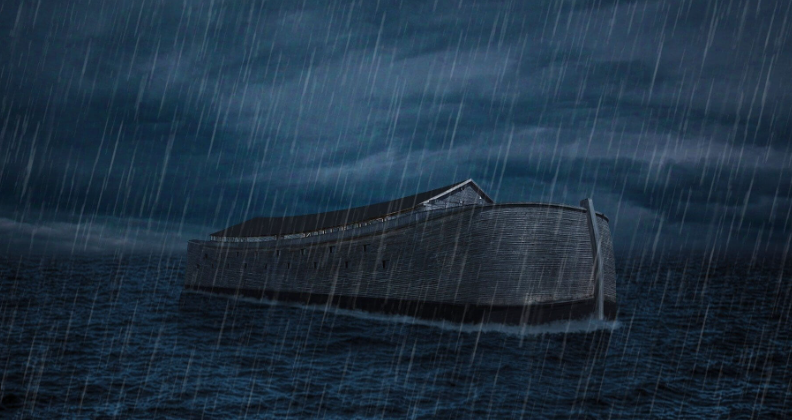
Genesis 8:1
And God remembered Noah, and every living thing, and all the cattle that was with him in the ark: and God made a wind to pass over the earth, and the waters asswaged;
Then God remembered Noah.
God’s covenant with Noah brought provision and protection in the midst of severe judgment. The remnant was preserved and God initiated steps toward reestablishing the created order on earth.
the waters subsided.
God used the wind to dry the ground; evaporation returned water to the atmosphere. We are given the record not only of the building up of the Flood but also of the prevailing and now the assuaging of the Flood.
We are told that “God remembered Noah”—how lovely—and that “God made a wind to pass over the earth, and the waters assuaged.” It did not happen just overnight. The buildup of the waters took over 150 days, and then there were 261 days in the assuaging.
After the global destruction of chapter 7, Genesis 8 begins with a comforting statement: God “remembered” Noah. This does not imply that God “forgot” Noah for a while. Rather, the idea is that Noah was always in God’s sight, and in His mind.
In addition, God was thinking of the animals that were with Noah on the ark. The same God who wiped out all of humanity and every kind of animal in judgment against the violence on the earth now turns and treats those He has saved with compassion and care.
God starts the process of removing the floodwaters from the earth. While the heaviest rains occurred in the first 40 days (Genesis 7:12), the next verse leaves open the possibility that lighter, less destructive rain has been falling since then (Genesis 8:2).
In the upcoming verses, all the water will finally stop. God also causes a great wind to spring up and begin to evaporate the waters.
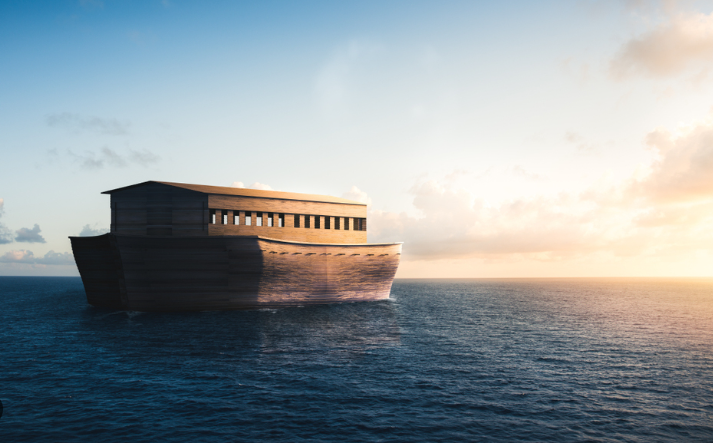
Genesis 8:2
The fountains also of the deep and the windows of heaven were stopped, and the rain from heaven was restrained;
The fountains also of the deep, and the windows of heaven, were stopped,….
The passages which let out the subterraneous waters in great quantity upon the earth, and the clouds of heaven, which poured down water upon it like spouts, were stopped from sending forth any more, as they had from the first of the flood unto one hundred and fifty days from thence.
And the rain from heaven was restrained:
This seems to confirm what has been before observed, that after the rain of forty days and nights it ceased not to rain, more or less, though not so vehemently, until the end of an hundred and fifty days, and then it entirely ceased.
In the previous verse, God started the process of drying out the earth, causing a great wind to blow over the planet. Here, we’re told that He also turns the incoming deluge of water off, closing the gushing “fountains of the deep” and shutting the “windows of the heavens.”
The destructive rainfall of the flood lasted for 40 days (Genesis 7:12), but it’s possible that a lighter rain has continued until this point in time. Those rains are “restrained,” not necessarily “prevented,” meaning a normal cycle of rain might have begun at this point.
With no new water entering the system and a strong wind blowing, the water level begins to decrease. From the moment Noah was told to enter the ark (Genesis 7:7–9), until the ark will finally touch solid ground again (Genesis 8:4), 150 days will have passed.
The land won’t be ready for Noah and the animals to leave at that point, but this was probably a very welcome feeling after several months bobbing on the sea.

Genesis 8:3
And the waters returned from off the earth continually: and after the end of the hundred and fifty days the waters were abated.
And the waters returned from off the earth continually,….
Or “going and returning”; they went off from the earth, and returned to their proper places appointed for them; some were dried up by the wind, and exhaled by the sun into the air: and others returned to their channels and cavities in the earth, or soaked into it:
And after the end of the hundred and fifty days, the waters were abated; Or began to abate, which days are to be reckoned from the beginning of the flood, including the forty days’ rain.
From the time of the ceasing of it, so that there were from the beginning of the flood one hundred and ninety days, six months, and ten days of the year of the flood now past.
The previous two verses described God’s process for reversing the flood. First, He caused a great wind to blow across the planet. Next, He stopped the water from gushing up from below and from falling from the sky.
The water level began to steadily drop. At its highest point, the flood covered the highest peaks of land by 15 cubits (22 feet or 7 meters).
This is more than high enough to drown any land-dwelling creature, and enough depth to keep the bottom of the ark from dragging on the ground.
Now, 150 days after Noah was first told to board the ark (Genesis 7:7–9), the waters are said to have abated. They still have a long way to go, but the flood waters have dropped enough for the ark to find a landing place, as the next verse will reveal.
In fact, the process of draining the flood waters is said to be continuous over this 150-day period, and beyond.
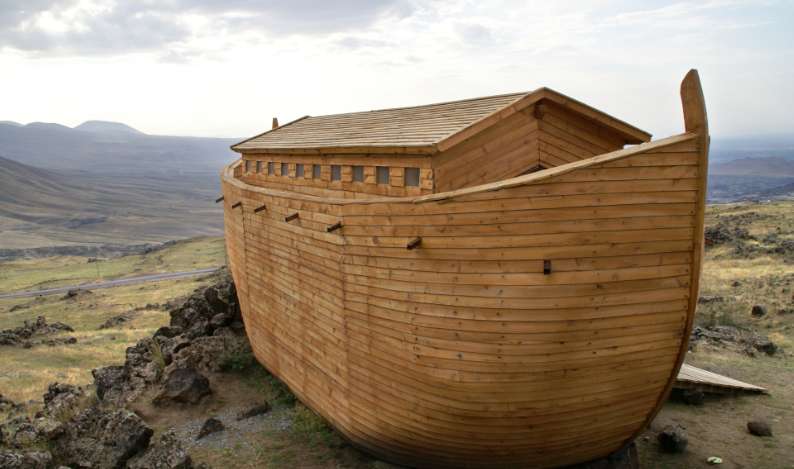
Genesis 8:4
And the ark rested in the seventh month, on the seventeenth day of the month, upon the mountains of Ararat.
And the ark rested in the seventh month, on the seventeenth day of the month,….
That is, five months after the flood began, and when the waters began to decrease; for this is not the seventh month of the flood, which lasted only five months, but of the year; the mountains of Ararat.
These were in the region of the Caucasus, also known as ancient Urartu, where the elevation exceeded 17,000 feet.
Once again, Genesis gives us a specific date in the history of the world upon which a major event occurred. The first one was given in Genesis 7:11 on the day the rains came. That was in the 600th year of Noah’s life on the seventeenth day of the second month.
Now the ark comes to rest on the mountains of Ararat on the seventeenth day of the seventh month. That makes five Old Testament months, or 150 days.
Why does this matter?
The writer means to show us that the flood was a genuine historical event marked by actual dates on the calendar. The writer of this passage does not intend this event to be seen as a myth, a spiritual metaphor, or a parable.
The intent is to present actual, physical history. These dates also would become a way of measuring time after the flood in the era following Noah’s life.
In addition, the writer means for us to see that the ark of Noah came to rest in a real geographical place in the world: the mountains of a region called Ararat.
Genesis’s first readers probably new that area as being north of Assyria, later known as Armenia. This is likely the same region we know as being in eastern Turkey, southern Russia, and northwestern Iran.
Though many have speculated and even searched for the ark, the text does not give a specific location for its resting place. There is no reason to think it would have survived until now.
Any wood on board would have been extremely valuable for building and for fuel, and unlikely to survive several thousand years.
Genesis 8:5
And the waters decreased continually until the tenth month: in the tenth month, on the first day of the month, were the tops of the mountains seen.
And the waters decreased continually until the tenth month,….
The decrease of the waters was for wise reasons exceedingly slow and gradual – the period of their return being nearly twice as long as that of their rise.
In the tenth month, on the first day of the month, were the tops of the mountains seen; not the tenth month of the flood, but of the year, the tenth from when the rain began.
The previous verse told us that the ark came to rest on the mountains of Ararat on a specific date: the seventeenth day of the seventh month of Noah’s 600th year.
The waters continued to steadily drain from the earth, but it still took until the first day of the tenth month for the tops of the mountains to become visible. That’s about another two and a half months, or ten weeks.
This is the third specific date given in the story of the flood. The date that land finally began to appear above the waters was significant enough to include in the official timeline.
One important reason for including these specific dates and locations in the story of the flood is to let readers know that this was an historical event. The writer is clearly of the opinion that these events happened to real people in the real world.
It wasn’t meant to be understood as a myth that happened in times before memory, or as a mere parable in some fantasy world. God intended for the story of the flood to be believed and taken seriously.
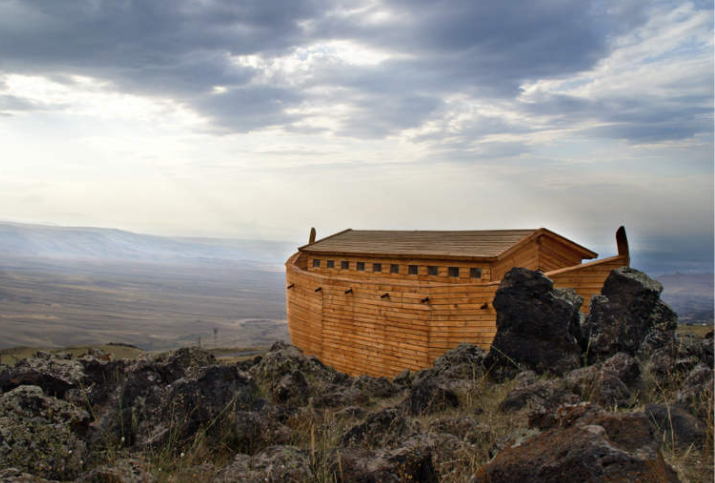
Genesis 8:6
And it came to pass at the end of forty days, that Noah opened the window of the ark which he had made:
It is easy to imagine the ardent longing Noah and his family must have felt to enjoy again the sight of land as well as breathe the fresh air.
And it was perfectly consistent with faith and patience to make inquiries whether the earth was yet ready. We could say that this is the beginning of the end of the Flood. Notice what Noah does:
The previous verse revealed that the steadily draining water had dropped low enough that the tops of the mountains had become visible. This landmark was achieved on the first day of the tenth month.
Noah allowed another 40 days to pass before opening a window in the ark, maybe in the roof, to send out a raven (Genesis 8:7).
This is a sailor’s tactic to locate dry land: a bird which has no interest in landing on the water will fly high enough to see for miles around, and if it cannot find dry land, it will eventually come back to the boat (Genesis 8:9).
Early on, it seems, there was nothing suitable nearby. This means that the visible mountaintops were probably a good distance away.
We’re told very little of life inside the ark. Were Noah and his family bored, terrified, eager to get outside, fully occupied by caring for all the different kinds of animals aboard? Without any details, we can only imagine.
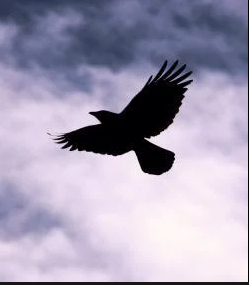
Genesis 8:7
And he sent forth a raven, which went forth to and fro, until the waters were dried up from off the earth.
The smell of carrion would allure it to remain if the earth were in a habitable state. But it kept hovering about the spot, and, being a solitary bird, probably perched on the covering.
The previous verse revealed that Noah waited 40 days after the tops of the mountains became visible before opening the window of the ark and sending out a raven.
As we’ll see in the following verses, the point of sending out a bird was to learn if any dry land was nearby. This practice was used by sailors in ancient times.
If the bird they released was not comfortable landing on water, it would fly high and look for land, then head in that direction. If the bird did just that, those aboard would know they were close to land.
If the bird came back, it meant it couldn’t see suitable land nearby (Genesis 8:9).
The raven flies back and forth until the waters dried up. Apparently, this bird never found land, probably returning to the ark regularly until the earth was dry enough to occupy.
Ravens were an unclean bird in God’s eyes. Genesis 7:2–3 revealed that God considered some animals and birds clean and others unclean. God had sent seven pairs of all the clean animals and birds on the ark.
As an unclean animal, this raven would have been part of a lone pair brought onto the ark. Unless the pair had reproduced already, it would need to survive its search missions in order for its species to survive.
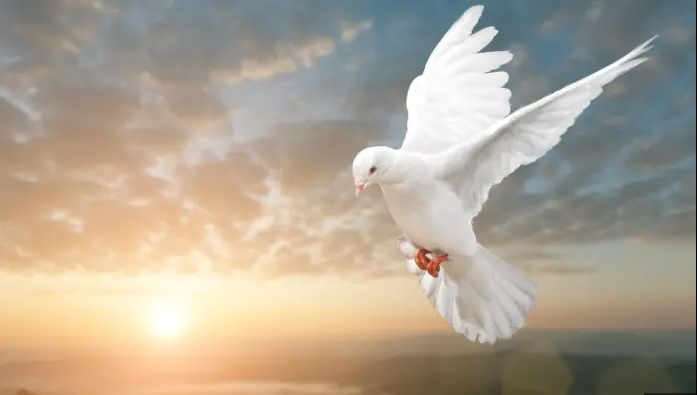
Genesis 8:8
Also he sent forth a dove from him, to see if the waters were abated from off the face of the ground;
Also he sent forth a dove from him,….
Frankly, Noah becomes a bird-watcher. He sends out these two birds, the raven and the dove. Seven days after he had sent out the raven, as in Genesis 8:10.
to see if the waters were abated from off the face of the ground; for the dove is a creature that delights in cleanness, flies low, and goes far off, so that if it returned not again, he might conclude that the waters were gone off the earth.
But being a sociable creature, and familiar to men, and especially loving to its mate, if they were not gone off, it would certainly return again.
Noah has been sending out a raven on failed missions to discover if the ground had become dry enough to occupy (Genesis 8:7). Now, Noah turns to a dove. The dove was a clean animal in God’s sight.
Genesis 7:2–3 revealed that God considered some birds and animals clean and others unclean. God sent seven pairs of each of the clean animals on the ark, but only one pair of those that were unclean in His eyes.
That means Noah had at least seven pairs of doves to choose from for this mission. If the waters had subsided from the face of the ground, the dove might not come back. However, the dove would be expected to come back to the ark in search of food.
If it came back empty-handed, Noah would assume that land was dried out enough for a bird to land on, but not yet ready to support life.
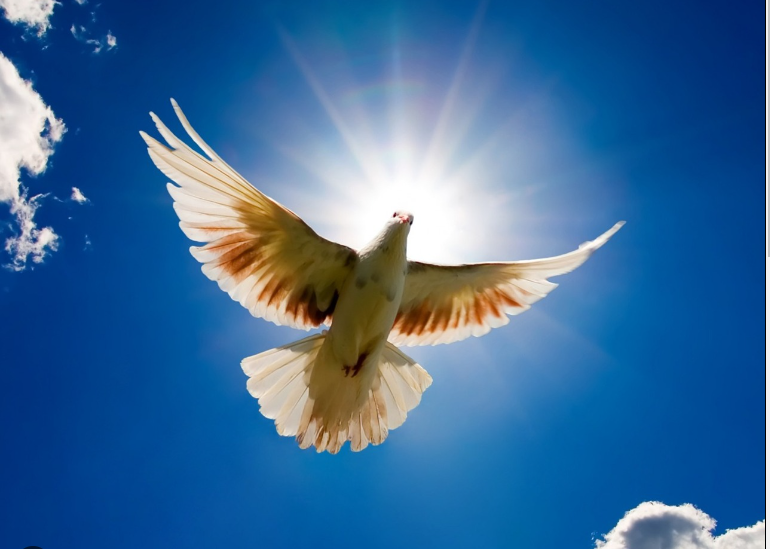
Genesis 8:9
But the dove found no rest for the sole of her foot, and she returned unto him into the ark, for the waters were on the face of the whole earth: then he put forth his hand, and took her, and pulled her in unto him into the ark.
But the dove found no rest for the sole of her foot, and she returned unto him into the ark,….
It being a creature that feeds upon seeds it picks off from the ground, and loving cleanness, it could find no place where it could alight, and have food to live upon, and retain its cleanness; for though the tops of the mountains were clear of the waters, yet they might be muddy and filthy with what the waters had raised up in them, or left upon them; and therefore it returned to Noah again, and not only like the raven unto the ark, but into it.
For the waters were on the face of the whole earth:
There was no place dry, and so neither food nor footing for this creature.
Which was an emblem of a sensible sinner, who finds no rest in anything short of Christ; not in worldly enjoyments; nor in external duties, not in hearing, reading, praying, fasting, nor in external humiliation and tears; nor in the law, and in the works of it; nor in natural descent, nor in education principles, nor in a profession of religion, and subjection to ordinances.
Only in Christ, where it finds rest from the burden and guilt of sin, and the tyrannical power of it; from the bondage, curse, and condemnation of the law, and from a sense of divine wrath and fear of it; and though not from afflictions, yet it finds rest in Christ amidst them.
Then he put forth his hand and took her, and pulled her in unto him into the ark: she hovered about it, and got near the window, which Noah opened and took her in; Which may represent the gracious reception sensible souls meet with from Christ, who apply to him.
He kindly embraces them, and they find room in His heart and affections, fulness of everything they want, and security from all danger.
In the previous verse, Noah began sending a dove out from the ark on a search mission. If it didn’t return, Noah would assume it had found dry land and food to keep it occupied.
However, the dove did return from this first of three missions. This verse specifies that the dove found nowhere to land. While the tops of mountains have been visible (Genesis 8:5), those peaks are apparently quite far away, or not suitable for life.
At this point, the majority of the land is still covered with water. Upcoming verses will explain that the flood is continually receding, quickly and steadily.
This verse gives us a rare glimpse of a relationship between Noah and the animals on the ark. When the dove returns, Noah is able to put out his hand and take hold of the female dove and bring her back into the ark.
It’s a picture of a gentle, hands-on connection between Noah and one of the animals he was responsible for.
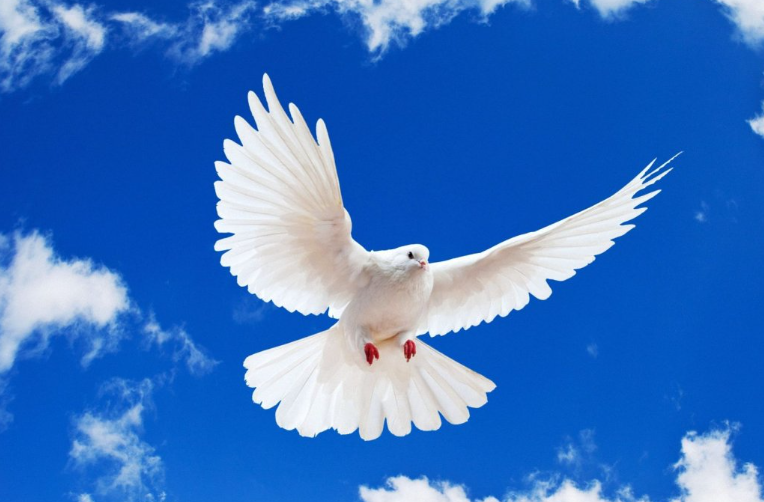
Genesis 8:10
And he stayed yet other seven days; and again he sent forth the dove out of the ark;
And he stayed yet other seven days,….
As he had stayed seven days between the sending out of the raven and the dove, so he stayed seven days more after he had sent out the dove, and it returned to him, waiting patiently for his deliverance, and the signs of it; though he could have been glad to have known its near approach, for which he made the experiments be did.
And again he sent forth the dove out of the ark; very probably the selfsame dove he had sent out before.
In the previous verses, Noah sent out birds in an effort to locate dry land. Sailors in ancient days would release a land-dwelling bird in order to locate land.
The bird would fly high to look for a place to go, and head in that direction if there was an island or shore nearby. If the bird came back, it meant there was nowhere close for it to land other than the ship.
Noah has already sent out a raven and then a dove from the ark. If these birds did not return, Noah could assume that they had found land where they’d prefer to stay; this would mean the earth was drying out enough to begin to support life again.
The first dove comes back empty-handed (Genesis 8:9). Noah waits seven days between these missions, suggesting that he is keeping to the same seven-day weekly calendar used prior to the flood. Some scholars suggest that Noah even observed a Sabbath in some way.
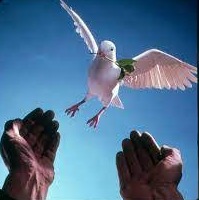
Genesis 8:11
And the dove came in to him in the evening; and, lo, in her mouth was an olive leaf pluckt off: so Noah knew that the waters were abated from off the earth.
And the dove came in to him in the evening,….
It having been out all day delighting itself in a free air, and perching upon the trees, but yet not finding sufficient food, or a proper lodging, it returned to Noah at the evening for food and dwelling in the ark: and, lo, in her mouth was an olive leaf plucked off.
Which might easily be done, and even an “olive branch”, as the word sometimes signifies, and is by some rendered; for it being now the summer season, young branches sprouted out, which being tender, were easily cropped.
In the previous verse, Noah sent out a dove from the ark, for a second try at finding dry land. If the bird did not come back, Noah would assume it had found dry land to occupy and that the earth was close to being ready to support all of the life sheltered aboard the ark.
This time, the dove returns again, but this time with a gift in her beak: a freshly plucked olive leaf. Noah’s conclusion was that the waters had finally subsided from the earth.
It has been some time since the first peaks of land emerged from under the flood (Genesis 8:5), and now those exposed areas of land are once again producing plant life.
There is not enough food or shelter to keep the dove from returning to the ark, but this is a wonderful sign of the future.
We’re not told anything of Noah’s emotional reaction to this moment. It’s not hard to guess that it would have been a significant experience.
After nearly a year shut in the ark, with no awareness of the outside world, this bit of leaf in a bird’s beak proved that life was happening outside. It was the first visual evidence that the land would once again support them after the destruction of the flood.
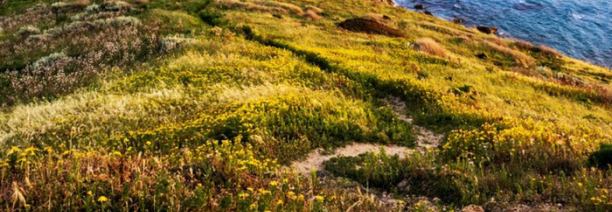
So Noah knew the waters were abated from off the earth
By this he perceived not only that they were gone off the mountains, but the lower grounds, at least the hills on which olive trees delight to grow; and yet that they were only abated, and not entirely gone off, since the dove returned to him.
This dove sent out the second time, and returning, may be considered as an emblem of a Gospel minister, comparable to a dove, for the dove like gifts of the Spirit of God, by which he is qualified for his work, and for his simplicity, harmlessness, meekness, and humility.
The olive leaf in its mouth may be an emblem of the Gospel, which is from Christ, the good olive; is the Gospel of peace, which an olive branch is a symbol of, proclaiming and publishing peace and reconciliation by Christ.
And as that is ever green, the Gospel always continues, and is the everlasting Gospel, and which was brought, and more fully and clearly dispensed in the evening of the world.
And by it, it is known that the waters of divine wrath are assuaged, and the people of God may be assured they will never return to come upon them.
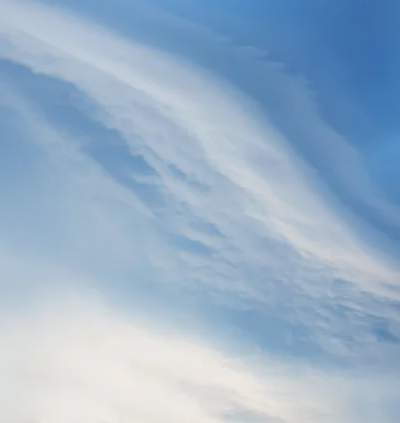
Genesis 8:12
And he stayed yet other seven days; and sent forth the dove; which returned not again unto him any more.
And he stayed yet other seven days,….
After the dove had returned:
and sent forth the dove;
the same dove again:
which returned not again unto him any more:
the earth being dry, it found rest for the sole of its feet, sufficient food to eat, and a proper place for its habitation; and liking to be at liberty, and in the open air, chose not to return to the ark, even though its mate was there:
I want you to see a great spiritual truth that we have here in the eighth chapter in this account of the raven and the dove. After Noah had spent over a year in the ark, he sent forth a raven, and the raven never came back.
But the dove kept coming back and even brought in its beak a little bit of greenery, an olive leaf. I do not know why the dove and olive leaf have always been symbolic of peace, but they are.
I cannot quite see that that is exactly the message of the dove’s second return. But when the dove did not return at all, that was the sign that the judgment was over and that peace had returned to the earth.
But, of course, man going out of the ark is the same type of man that all the sons of Adam were who had provoked the Flood as a judgment from God in the first place.
You are going to see that there is not too much improvement in man after the Flood; in fact, there is none whatsoever. There is a great spiritual lesson here which I would not have you miss for anything in the world.
Noah is engaged here in “birdwatching.” He sends out the raven, and the raven does not come back.
In this passage, Noah has sent a raven and two doves out from the ark to search for dry land. Sailors used to use this trick to find dry land. Birds which came back did so because they were too far from a place to comfortably rest.
The assumption was that if the bird did not return, it must have found a place to land. That would mean that the earth had become dry enough following the flood to support life again.
The last dove sent out by Noah returned, but with a bit of olive leaf caught in her beak. This was hard evidence, for Noah, that the earth was dry enough that plant life had once again begun to grow.
After another seven days, Noah sends out another dove. This one never comes back. She was the first occupant of the ark to find a home back in the outside world. For Noah and the others, that meant it was time to start planning to disembark and begin life over again.
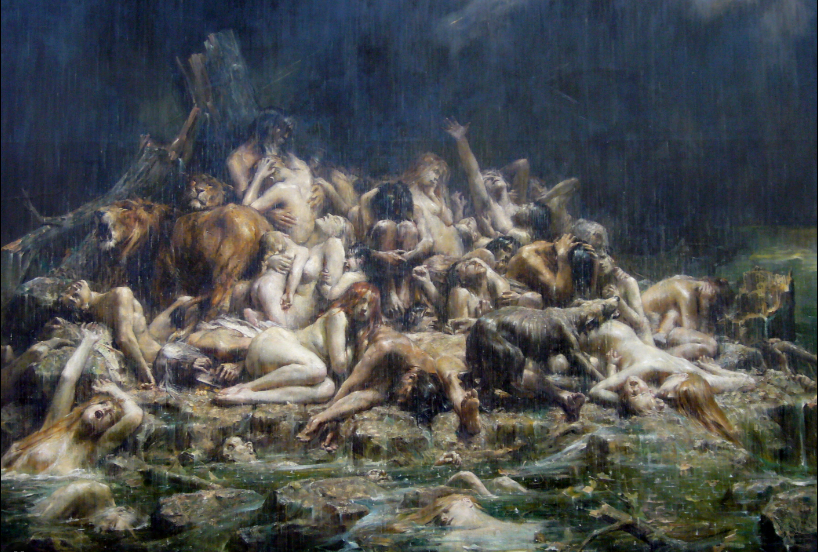
Why didn’t that raven come back?
You must recognize what that raven eats—it feeds on carrion. There was a whole lot of flesh of dead animals floating around after the Flood, and that was the kind of thing this old crow ate.
He did not return to the ark because he was really going to a feast, and he was having a very wonderful time. The raven was classified as an unclean bird, by the way.
The dove is a clean bird and is so listed later on in Scripture. Remember that Noah took into the ark both the clean and the unclean animals.
The dove brought back information: it was a regular homing pigeon. With the dove’s second trip, Noah was now a confirmed birdwatcher—and the dove brought back evidence that the dry land was appearing.
The third time, the dove did not return, and Noah knew that the waters of judgment were gone. I have said before that all great truths of the Bible are germane in Genesis.
The Bible teaches that the believer has two natures, an old and a new nature: “Therefore if any man be in Christ, he is a new creature: old things are passed away; behold, all things are become new” (2 Cor. 5:17).
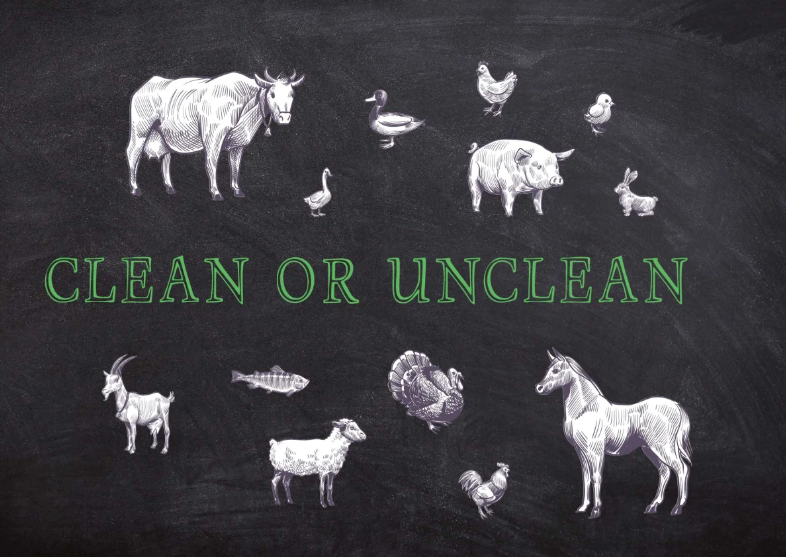
The clean and the unclean are together
You and I as believers have these two natures. Our Lord said: “That which is born of the flesh is flesh; and that which is born of the Spirit is spirit” (John 3:6).
And Paul writes: “for I knew that in me (that is, in my flesh,) dwelleth no good thing: for to will is present with me; but how to perform that which is good I find not” (Rom. 7:18).
Paul spoke of a struggle between the two natures. And there is a struggle today between the old nature and the new nature of a believer.
The raven went out into a judged world, but he found a feast in the dead carcass because that is the thing he lived on.
The bloated carcass of an elephant would have made him a banquet; I tell you, it would have been for him a bacchanalian orgy. Back and forth, he restlessly went up and down.
May I say to you, that is the picture of the old nature; the old nature is like that raven. The old nature loves the things of the world and feasts on them.
That is the reason so many people watch television on Sunday night and do not go to church. Don’t tell me that you have some good excuse for that.
You do have an old nature, but that is no excuse because you ought not to be living in the old nature. The dove went out into a judged world, but she found no rest, no satisfaction, and she returned to the ark.
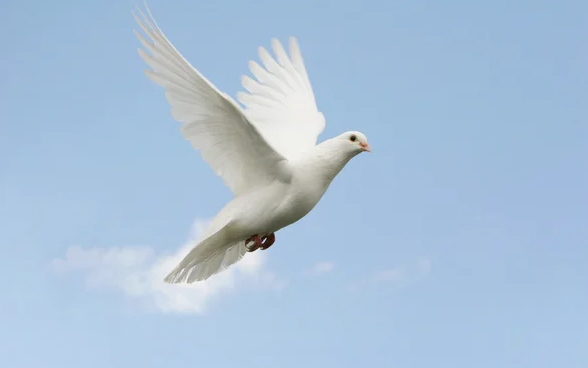
The dove represents the believer in the world
The old raven went out into the world and loved it. When he found that old carcass, he probably thought the Millennium had arrived!
The believer is told, “Love not the world, neither the things that are in the world . . .” (1 John 2:15). You and I are living in a judged world today. We are in the world, but not of it.
We are to use it, but not abuse it. We are not to fall in love with it, but we are to attempt to win the lost in this world and get out the Word of God.
Our Lord told us, “. . . Go ye into all the world, and preach the gospel to every creature” (Mark 16:15). Let’s take care of our job down here and get out the Word of God—that is the important thing.
The dove recognized what kind of a world she was in, and she found no rest. She found rest only in the ark, and that ark sets forth Christ, if you please.
Let me ask you these very personal question:
What kind of bird are you?
Are you a raven or a dove?
If you are a child of God, you have both natures—but which one are you living in today?
Do you love the things of God, or don’t you?
I hope that you have really enjoyed this post,
Please Leave All Comments in the Comment Box Below ↓













One of my first memories as a child learning about the Bible, was Noah sending out the dove to find dry land.
And the the rainbow as a sign from God at the end of the flood. And this beautiful Bible story is still being shared around the world today.
This is a timely reminder about the greatness of God and how he looks after us and those that obey him.
Hello Again,
Thank you for another comment on this website.
Genesis 9:16
And the bow shall be in the cloud; and I will look upon it, that I may remember the everlasting covenant between God and every living creature of all flesh that is upon the earth.
Genesis 9:17
And God said unto Noah, This is the token of the covenant, which I have established between me and all flesh that is upon the earth.
I couldn’t agree more.
Have A Blessed Day,
Jerry
Whenever I catch sight of a rainbow, it triggers the recollection of this particular story. It prompts me to contemplate whether I would be counted among the believers or among those who doubted.
Furthermore, it serves as a reminder of God’s love and His promises to us.
Additionally, it reminds us about Noah’s unwavering faith.
In our present lives, we aspire to possess such faith – the ability to stay devoted to God. God bestowed Noah with extraordinary faith, hope, trust and confidence, enabling him to wholeheartedly obey God’s commands and generously share His grace with his family.
Hello Ana,
Thank you for allowing yourself to be a part of this HBS & DwJ Platform.
Your reading, comprehended perspective, and valuable comment is greatly appreciated. I agree wholeheartedly.
Please feel free to stop by and share your thoughts on other information on this HBS & DwJ website anytime, your perspective is definitely welcomed.
Blessings My Friend!
Thank you for sharing such a detailed and thoughtful examination of Genesis 8.
Your commentary really brings to life the patience and faith Noah demonstrated during this time. It’s interesting to reflect on the slow decrease of the floodwaters, not as a simple waiting period, but as an intentional time of anticipation and preparation for the new beginning that would follow.
I’m particularly struck by your reminder that “the writer of this passage does not intend this event to be seen as a myth, a spiritual metaphor, or a parable. The intent is to present actual, physical history.”
This serves as an important reminder of the real-world implications and lessons we can draw from these texts, and the lasting impact they have had on human history and culture.
Hello Anoth,
Thank you for continuing to stop by, read, and take time to comment on yet another Holy Bible Study session, turned HBS & DwJ Podcast episode.
Thank you for your continued support with helping HBS & DwJ spread GOD’s Word.
You are most certainly welcome for the sharing of such a detailed and thoughtful examination of Genesis 8. Thank you for considering it this way.
Blessings My Friend!
Thank you for sharing this insightful article about the story of Noah and the Flood.
As someone who is new to this topic but interested in learning more, I have a question about the significance of the raven and the dove in the story. I noticed that the raven and the dove were sent out to find dry land after the Flood. The raven found no rest and didn’t return, while the dove initially returned but later brought back an olive leaf and finally did not return.
What do the raven and the dove represent symbolically in the context of the story, and what spiritual lessons can we learn from their actions and Noah’s response to them?
Hello skamalka,
Thank you for continuing to return to, read, and comment on the HBS & DwJ website turned Podcast episode platform.
Ravens were an unclean bird in God’s eyes. The raven possibly symbolizes the ability of us sinful human beings to survive in the harshest conditions. Ravens brought intelligence as well as resourcefulness. In this way, it represents all those who are able to find solutions in difficult situations and make use of available resources.
The Holy Bible warns of the consequences of disobeying what God has told us regarding his commandments. So the raven’s carnivorous habits can also symbolize the punishment meted out to an offending party.
While the Holy Spirit is mentioned earlier in Mathew’s gospel in connection with the conception of Jesus, this is the first use of imagery to describe the Holy Spirit in the New Testament… and it’s a bird… a heavenly creature, a dove.
The Dove is a clean bird in God’s eyes.
Thank you so much for your participation,
Blessings My Friend!
Thanks for your Bible study on the end of the Flood!
It’s always striking to see that God never forgets you and that you’re still on His sight at all times. Noah’s story also teaches us that we must remain faithful to God’s laws in every circumstance.
And isn’t it the era where vegetarianism ended because there was no vegetation on the earth?
Very interesting study!
Hello angelce903,
Thanks for continuously stopping by the HBS & DwJ website, turned podcast, this time to comment on this GOD Remembers Noah – The Rains Dry Up (G-8-HBS) episode.
Genesis 9:3 KJV says:
[3] Every moving thing that liveth shall be meat for you; even as the green herb have I given you all things.
(Humanity’s diet now is expanded beyond the vegetation permitted in Genesis 1:30, and meat becomes a new source of protein.)
Now God gives to man a new provision for food. Before the Flood God gave to man the green earth, the plant life, to eat. Now He tells Noah that he is able to eat animal life.
You are most certainly welcome for the interesting study.
Blessings My Friend!
Sharing is caring the say, and you’ve done a fantastic job in sharing your knowledge on your blog.
Hello Felix,
Thank you for your comment, as well as your continued visits to this platform.
Blessings My Friend!